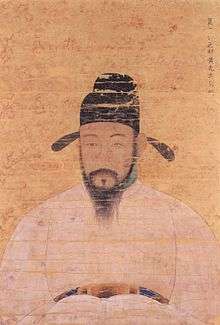Hwang Hui
Hwang Hui (8 March 1363 – 28 February 1452) was a politician of the Goryeo dynasty and Joseon Dynasty, who once served as prime minister of the Joseon Dynasty from 1431 to 1449 .
| Hwang Hui | |
 | |
| Korean name | |
|---|---|
| Hangul | |
| Hanja | |
| Revised Romanization | Hwang Hui |
| McCune–Reischauer | Hwang Hŭi |
| Pen name | |
| Hangul | |
| Hanja | |
| Revised Romanization | Bangchon |
| McCune–Reischauer | Bangchŏn |
| Courtesy name | |
| Hangul | |
| Hanja | |
| Revised Romanization | Gubu |
| McCune–Reischauer | Gubu |
| Posthumous name | |
| Hangul | |
| Hanja | |
| Revised Romanization | Ikseong |
| McCune–Reischauer | Iksŏng |
Biography
Hwang Hui was an official of Goryeo Dynasty. He became an official in the Joseon Dynasty in 1394. Hwang Hui once banished from Seoul because he advocated Yangnyeong, the eldest prince of King Taejong, despite his bad behavior in 1418. After King Sejong the Great's enthronement, Hwang Hui got reappointed and held many ministerial posts. Hwang Hui was appointed as a prime minister in 1431 and served until 1449 . He retired from the government after 18 years.
Achievement
He distributed grain seeds for improving farming, and ordered each province to plant a lot of mulberry trees to enrich human life. In addition, the publication of ' economic land ' was divided into ' 續 典 ' and ' 集 . ', which allowed the contents to be duplicated, omitted or separated from the content and reality.[1]
Meanwhile, a defense measure was taken to prevent the North's wildling and southern regions by paying attention to defense issues. And in an effort to obtain a wide range of good manners, the etiquette of Goryeo was revised and supplemented, taking into account the reality of the Ming Dynasty and Joseon Dynasty.[1]
Description of Hwang Hui
He served as the Yeonguijeong, the highest ranking of 3 appointed royal prime ministers (the others being Uuijeong and Jwaguijeong) for a total of 18 years with a total of 24 years service to the monarchy. He was noted for his political philosophy that stated, “That which is just takes priority and must be enacted.” Priorities during his administration included agricultural improvement, mitigating laws that increased social class gaps, and providing opportunities for candidates born out of wedlock or from concubines to take the civil service examination.[2]
In popular culture
- Portrayed by Kim Kap-soo in the 2008 KBS2 TV series King Sejong the Great[3]
- Portrayed by Jeon Seung-hwan in the 2011 SBS TV series Deep Rooted Tree.[4]
- Portrayed by Baek Yoon-sik in the 2012 film I Am the King.[5]
- Portrayed by Kim Kap-soo in the 2015 MBC TV series Splash Splash Love.[6]
- Portrayed by Jung Han-yong in the 2016 KBS1 TV series Jang Yeong-sil.[7]
References
- "황희(黃喜) - 한국민족문화대백과사전". encykorea.aks.ac.kr (in Korean). Retrieved 2018-06-10.
- http://jangsu.hwang.co.kr/jangsu/inmul-01.html Archived July 22, 2011, at the Wayback Machine
- "KBS대하드라마 대왕세종". www.kbs.co.kr. Retrieved 2018-05-20.
- "뿌리깊은 나무". programs.sbs.co.kr (in Korean). Retrieved 2018-05-20.
- "나는 왕이로소이다" (in Korean). Retrieved 2018-05-20.
- "단막극 <퐁당퐁당 love>". www.imbc.com (in Korean). Retrieved 2018-05-20.
- "KBS 드라마 장영실". KBS (in Korean). Retrieved 2018-05-20.
See also
- Sejong the Great
- Maeng Saseong